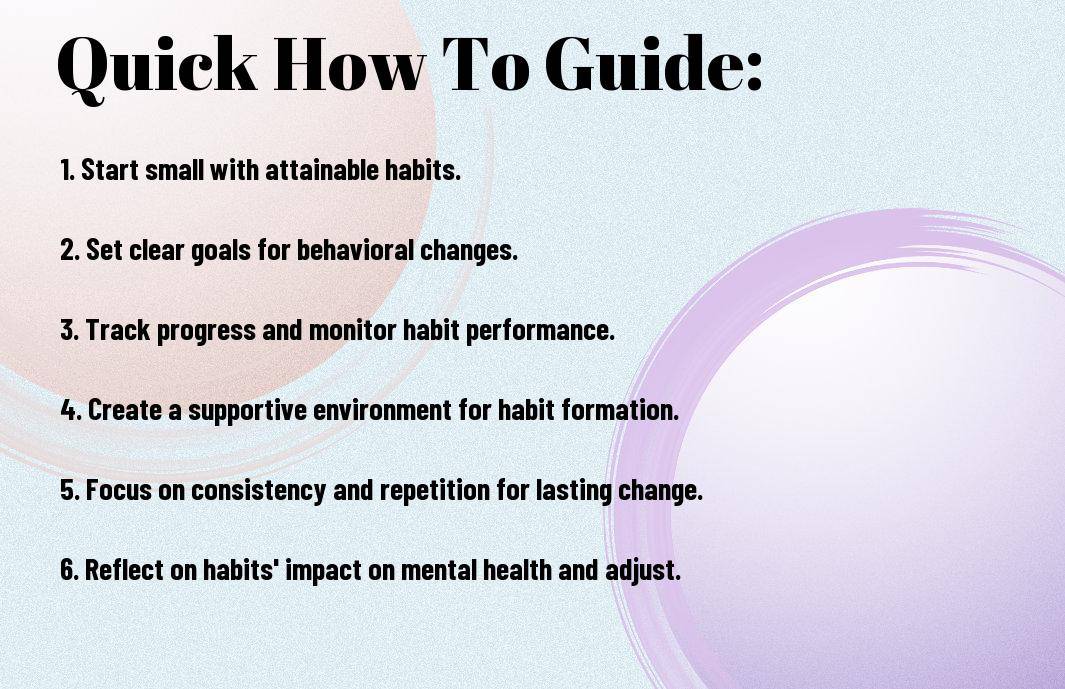Most of us strive for good mental health and overall wellbeing in our daily lives. However, achieving these goals can sometimes feel overwhelming or out of reach. The key lies in understanding the significant impact that small, consistent habits can have on our mental health and overall well-being. By incorporating the principles of Atomic Habits, popularized by author James Clear, we can make positive, lasting changes in our lives that promote better mental health and overall well-being.
Key Takeaways:
- Create small habits: Building small atomic habits can lead to significant improvements in mental health over time.
- Focus on consistency: Consistently practicing positive habits can help stabilize emotions and reduce stress.
- Build a routine: Establishing a daily routine can provide structure and a sense of security, promoting mental well-being.
- Track your habits: Monitoring your habits can help you identify triggers and patterns that affect your mental health.
- Practice mindfulness: Incorporating mindfulness practices into your daily routine can help reduce anxiety and increase self-awareness.
- Seek social support: Building connections with others and seeking support can improve mental health and provide a sense of belonging.
- Be patient and kind to yourself: Progress takes time, so be patient with yourself and celebrate small victories along the way.

Foundations of Atomic Habits
The Science Behind Atomic Habits
To truly understand the power of atomic habits in transforming our mental health and overall wellbeing, it’s crucial to explore the science behind it. Any positive change we want to make in our lives is deeply rooted in our habits – the daily routines, thoughts, and actions that shape our behavior.
Understanding Habit Formation and Its Impact on Mental Health
To grasp the significance of atomic habits in improving mental health, we need to understand how habits are formed and the profound impact they have on our well-being. Habits are not just about what we do, they are about who we are becoming. By making small, positive changes consistently, we can rewire our brains and create a foundation for a healthier mindset and lifestyle.
Impact can clearly be seen in how habits influence our mental health. From reducing stress and anxiety to boosting self-confidence and resilience, our habits play a crucial role in shaping our overall well-being. By understanding the connection between our habits and mental health, we can cultivate a more intentional and positive way of living.
Atomic habits are not just about making changes, they are about building a framework for long-lasting transformation. By focusing on small, consistent actions, we can create powerful habits that have a profound impact on our mental health and well-being.
How to Craft Atomic Habits for Mental Wellbeing
After learning about the power of atomic habits in improving mental health and wellbeing, it’s time to explore into the practical steps for implementing these habits in your daily life. One of the first steps in this process is to identify the negative habits that may be hindering your mental wellbeing.
Tips for Identifying Negative Habits to Change
- Pay attention to triggers that lead to negative habits.
- Keep a journal to track your thoughts and behaviors.
- Seek feedback from trusted individuals about your habits.
Recognizing these negative habits is the first step towards creating a plan for change.
Strategies for Developing Positive Mental Health Habits
You have the power to transform your mental health by cultivating positive habits. By incorporating mindfulness practices, regular exercise, and healthy sleep routines into your daily life, you can build a strong foundation for mental wellbeing.
Strategies such as seeking professional help when needed, practicing gratitude, and surrounding yourself with a supportive community can also play a significant role in nurturing your mental health. Keep in mind, small changes in your habits can lead to big improvements in your overall wellbeing.
Factors Influencing Habit Sustainability
Many factors influence the sustainability of habits, especially when it comes to mental health and wellbeing. Understanding these factors can help individuals cultivate habits that stick in the long term. Here are some key elements that play a role in habit sustainability:
- Consistency: Regularly practicing a habit is crucial for it to become ingrained in your routine.
- Environment: The space in which you perform your habits can either support or hinder their sustainability.
- Community and Relationships: Having a support system can greatly impact your ability to maintain healthy habits.
- Motivation: Finding intrinsic and extrinsic motivations can help you stay committed to your habits.
Perceiving the intricate connection between these factors can significantly enhance your chances of successfully adopting and maintaining habits that promote better mental health and wellbeing. To explore more atomic habits for mental health, you can check out 19 Atomic Habits for Your Mental Health | by Anca Budau.
The Role of Environment in Supporting Habits
Now, let’s investigate into how the environment can either facilitate or hinder the sustainability of habits. Your physical surroundings, such as your home or workspace, can either make it easy or challenging to stick to your habits. Creating an environment that supports your desired behaviors can significantly boost your chances of success in maintaining them.
Leveraging Community and Relationships
With the help of a supportive community and strong relationships, you can enhance the sustainability of your habits. Surrounding yourself with like-minded individuals who encourage and motivate you can have a profound impact on your ability to stick to your habits. Whether it’s joining a fitness group, online community, or sharing your goals with friends and family, leveraging the power of community and relationships can make a huge difference in your habit sustainability.
Building Blocks of Healthy Habits
Your 6 atomic habits I tried during my vacation to improve my physical and mental well-being can serve as a blueprint for cultivating better habits in your daily life. These tiny changes can lead to significant improvements in your mental health and overall well-being. By incorporating these habits into your routine, you can build a solid foundation for a healthier lifestyle.
How-to Guide for Creating Small but Powerful Habits
Now, let’s look into a how-to guide for creating small but powerful habits. Start by identifying specific actions you want to turn into habits. Make them simple and easy to incorporate into your daily routine. Consistency is key when it comes to forming habits, so aim to perform these actions daily. Over time, these small habits will compound and create a positive impact on your mental health.
Tips for Making Habits Enjoyable and Rewarding
On the journey to building healthy habits, it’s imperative to make the process enjoyable and rewarding. Incorporate fun activities or rewards into your habit-building routine to keep yourself motivated. Find ways to celebrate your progress and accomplishments along the way. Any setbacks should be viewed as opportunities to learn and grow.
- Find ways to make your habits enjoyable and engaging.
- Reward yourself for sticking to your habits consistently.
- Be mindful of, progress is more important than perfection, and it’s okay to slip up occasionally. Any setbacks should be viewed as opportunities to learn and grow.

Overcoming Common Challenges
Unlike a quick fix, developing good habits for mental health and wellbeing is a journey that requires patience and persistence. As outlined in the Habits Guide: How to Build Good Habits and Break Bad Ones, setbacks and plateaus are common experiences when striving for personal growth. It’s important to approach these challenges with a positive mindset and a willingness to adapt.
How to Deal with Setbacks and Plateaus
Some days will be harder than others, and that’s okay. When faced with setbacks or plateaus in your mental health habits, it’s crucial to remind yourself of the progress you’ve already made. Reflect on the positive changes you’ve experienced and use them as motivation to keep moving forward. Remember that setbacks are not failures but opportunities for learning and growth. Stay consistent, stay patient, and trust the process as you navigate these temporary obstacles on your journey towards better mental wellbeing.
Adapting Habits to Changing Life Circumstances
Assuming that your life circumstances will remain constant is a common mistake when establishing habits for mental health. As life is ever-evolving, it’s crucial to be flexible and adaptable when it comes to your habits. Your routine may need to change due to shifting priorities, unexpected events, or new responsibilities. Embrace these changes by reassessing and modifying your habits to better suit your current situation. Do not forget, the key to long-term success is not rigidity but the ability to adjust and evolve along with life’s twists and turns.
Measuring Progress and Adjusting Strategies
Identifying Metrics for Mental Health Improvement
Now, when it comes to improving your mental health and wellbeing, it’s crucial to identify metrics that can help you gauge your progress. These metrics can be anything from the number of days you practice mindfulness to the amount of time you spend engaging in activities that bring you joy. By tracking these metrics, you can have a clearer picture of what is working and what might need adjustment along the way.
How to Tweak Your Habits for Continuous Growth
Improvement starts with being open to tweaking your habits for continuous growth. By regularly assessing your habits and their impact on your mental health, you can make necessary adjustments to optimize your well-being. This could involve changing the time of day you exercise, trying a new relaxation technique, or even seeking professional help when needed.
For instance, if you notice that certain habits are causing more stress than relief, it’s important to address them promptly. Ignoring warning signs can hinder your progress and prevent you from reaching your mental health goals. Recall, it’s okay to experiment with different strategies until you find what works best for you.
Maintaining Momentum and Building a Habitual Lifestyle
Keep the momentum going by staying motivated on your journey to building habits that improve your mental health and wellbeing. It’s easy to start strong with a new habit, but maintaining that momentum is the key to long-term success in building a habitual lifestyle.
Tips for Staying Motivated in Your Habit Journey
- Set specific and achievable goals to track your progress.
- Find an accountability partner to support you along the way.
- Reward yourself for reaching milestones to celebrate your successes.
After implementing these tips, you will find it easier to stay motivated and build a sustainable habitual lifestyle that promotes your mental health and overall wellbeing.
How to Cement Habits for Long-Term Mental Wellbeing
While building habits is crucial, mental well-being is equally important. Consistency is the foundation for building long-term habits that positively impact your mental health.
Wellbeing is a holistic approach that encompasses physical, emotional, and mental health. By cementing habits that prioritize your well-being, you can create a lifestyle that promotes a positive mindset and overall mental wellness.
Final Words
Considering all points mentioned about how Atomic Habits can improve mental health and overall wellbeing, it becomes clear that even small changes in our daily habits can have a significant impact on our lives. By implementing the principles of this book, such as making small, incremental changes, leveraging the power of routine, and tracking progress, individuals can commence on a journey of self-improvement and personal growth.
Atomic Habits provides a roadmap for cultivating positive habits that can lead to better mental health, increased happiness, and a more fulfilling life. By taking the time to understand our habits and the triggers that influence them, we can make intentional choices that align with our goals and values. Through consistent practice and a commitment to improvement, anyone can create lasting change and transform their mental health and overall wellbeing for the better.
FAQ
Q: Why is developing atomic habits important for improving mental health and wellbeing?
A: Developing atomic habits is important for improving mental health and wellbeing because small consistent actions add up over time to create positive changes in your life. These micro improvements can lead to significant mental health benefits and a better overall sense of wellbeing.
Q: What are atomic habits?
A: Atomic habits are small, incremental changes or actions that you make on a daily basis. These are tiny habits that are easy to implement and maintain, but have a powerful impact when practiced consistently over time.
Q: How can atomic habits help in managing stress and anxiety?
A: Atomic habits help in managing stress and anxiety by providing structure and routine to your daily life. By breaking down big goals into small, manageable tasks, you can reduce feelings of overwhelm and increase feelings of control and calm.
Q: What are some examples of atomic habits for improving mental health?
A: Examples of atomic habits for improving mental health include daily meditation for 5 minutes, going for a short walk each day, journaling your thoughts before bed, practicing gratitude by writing down three things you’re thankful for every morning, or taking deep breaths when you feel overwhelmed.
Q: How long does it take to form an atomic habit?
A: It typically takes about 21 days to form a new habit, but this can vary from person to person. Consistency is key in establishing atomic habits, so aim to practice your habit daily for at least a few weeks to make it stick.
Q: What should I do if I struggle to maintain my atomic habits?
A: If you struggle to maintain your atomic habits, try breaking them down even further into smaller, more manageable tasks. You can also try linking your new habit to an existing habit, setting reminders or alarms, or enlisting the support of a friend or accountability partner.
Q: How can atomic habits contribute to overall wellbeing?
A: Atomic habits contribute to overall wellbeing by helping you cultivate a sense of discipline, self-control, and personal growth. By making small positive changes every day, you can build momentum and confidence, leading to improved mental health and a greater sense of wellbeing.



